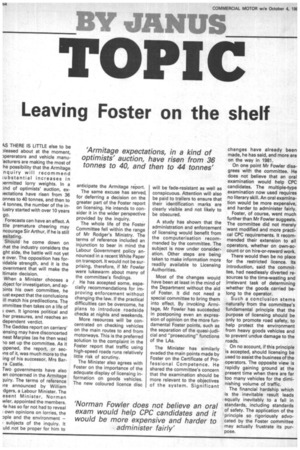TI C
Page 66

If you've noticed an error in this article please click here to report it so we can fix it.
Leaving Foster on the shelf
'Armitage expectations, in a kind of optimists' auction, have risen from 36 tonnes to 40, and then to 44 tonnes'
NS THERE IS LITTLE else to be )leased about at the moment, vererators and vehicle manuacturers are making the most of he possibility that the Armitage nquiry will recommend ;ubstantial increases in ?ermitted lorry weights. In a ind of optimists' auction, ex?ectations have risen from 36 onnes to 40 tonnes, and then to .4 tonnes, the number of the inlustry started with over 10 years go.
Forecasts can have an effect. A ttle premature cheering may ncourage Sir Arthur, if he is still esitating.
Should he come down on that the industry considers the ght side, the battle will not yet e over. The opposition has forlidable strength, and it is the overnment that will make the Itimate decision. .
When a Minister chooses a ibject for investigation, and apDints his own committee, he lust expect that the conclusions ill match his predilections. The ?mmittee then takes on a life of ; own. It ignores political and her pressures, and reaches an dependent verdict.
The Geddes report on carriers' .ensing may have disconcerted nest Marples (as he then was) io set up the committee. As it rppened, the report, or secins of it, was much more to the ing of his successor, Mrs Barra Castle.
Two governments have also en concerned in the Armitage luiry. The terms of reference ?re announced by William dgers, a Labour Minister. The esent Minister, Norman wler, appointed the members. -le has so far not had to reveal . own opinions on lorries, the Dple and the environment subjects of the inquiry. It uld not be proper for him to anticipate the Armitage report.
The same excuse has served for deferring a decision on the greater part of the Foster report on licensing. He intends to consider it in the wider perspective provided by the inquiry.
The whole life of the Foster Committee fell within the range of Mr Rodger's Ministry. The terms of reference included an injunction to bear in mind the Labour Government policy announced in a recent White Paper on transport. It would not be surprising, therefore, if Mr Fowler were lukewarm about many of the committee's findings.
/ He has accepted some, especially recommendations for improving enforcement without changing the law. If the practical difficulties can be overcome, he plans to introduce roadside checks at nights and weekends.
More resources will be concentrated on checking vehicles on the main routes to and from motorways. This is the preferred solution to the complaint in the Foster report that traffic using high-speed roads runs relatively little risk of scrutiny.
The Minister also agrees with Foster on the importance of the adequate display of licensing information on goods vehicles. The new coloured licence disc will be fade-resistant as well as conspicuous. Attention will also be paid to trailers to ensure that their identification marks are clearly visible and not likely to be obscured.
A study has shown that the administration and enforcement of licensing would benefit from the computerisation recommended by the committee. The subject is now under consideration. Other steps are being taken to make information more readily available to Licensing Authorities.
Most of the changes would have been at least in the mind of the Department without the aid of Foster. It did not need a special committee to bring them into effect. By invoking Armitage, Mr Fowler has succeeded in postponing even an expression of opinion on the more fundamental Foster points, such as the separation of the quasi-judicial and "prosecuting" functions of the LAs.
The Minister has similarly evaded the main points made by Foster on the Certificate of Professional Competence. He shared the committee's concern that the examination should be more relevant to the objectives of the system. Significant changes have already been made, he has said, and more are on the way in 1981.
On one point Mr Fowler disagrees with the committee. He does not believe that an oral examination would help CPC candidates. The multiple-type examination now used requires no literary skill. An oral examination would be more expensive, and harder to administer fairly.
Foster, of course, went much further than Mr Fowler suggests. The committee did not merely want modified and more practical CPC requirements. It recommended their extension to all operators, whether on own-account or on hire-or-reward work.
There would then be no place for the restricted licence. Its introduction, said the committee, had needlessly diverted resources to the time-wasting and irrelevant task of determining whether the goods carried belong to the operator.
Such a conclusion stems naturally from the committee's fundamental principle that the purpose of licensing should be only to promote road safety, to help protect the environment from heavy goods vehicles and to prevent undue damage to the roads.
On no account, if this principle is accepted, should licensing be used to assist the business of the operators. The opposite view is rapidly gaining ground at the present time when there are far too many vehicles for the diminishing volume of traffic.
The financial hardship which is the inevitable result leads equally inevitably to a fall in standards, including standards of safety. The application of the principle so rigoriously advocated by the Foster committee may actually frustrate its purpose.












































































































